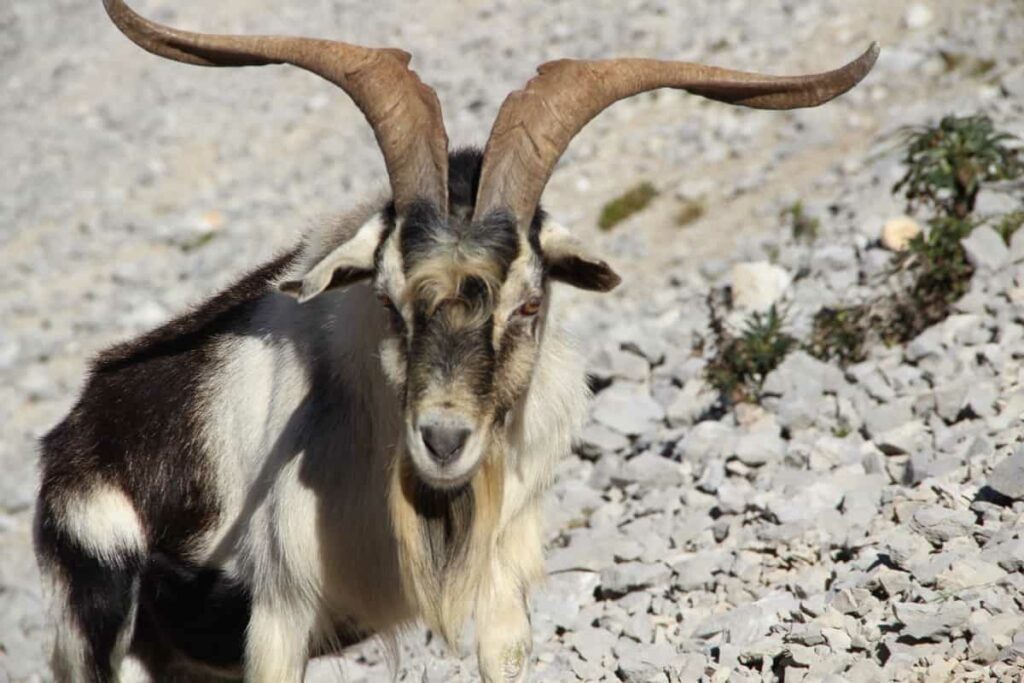The Spanish Goat is a versatile and hardy breed that has found its place in the agricultural landscape. Spanish goat farming offers many benefits, making it an attractive choice for farmers worldwide. One of the primary advantages is their exceptional adaptability to various climates and terrains. Spanish goats can thrive and produce high-quality meat and milk. Let’s check out more information on spanish goat breed below.

The Behavior of Spanish Goats
It is known to be independent and adaptable. They are hardy animals that have developed survival instincts over the years, making them well-suited for various environments. These goats are known for their agility and resourcefulness, as they can easily navigate rough terrain. One notable behavior of Spanish goats is their ability to forage efficiently. This adaptability also extends to their social behavior, as Spanish goats are generally docile and easy to handle.
Housing Requirement for Spanish Goat Breed
- Spanish goats are known for their adaptability and resilience. These hardy creatures can thrive in various environments, making them an ideal choice for farmers and homesteaders.
- Adequate shelter is essential to protect the goats from extreme weather conditions. A sturdy barn or shed provides a safe place during inclement weather and offers protection from predators.
- In addition to providing shelter, it’s important to ensure that the housing area has ample space for exercise and grazing.
- Proper ventilation is another crucial aspect of goat housing. Good airflow helps reduce the risk of respiratory issues and keeps the animals comfortable throughout the year.
Characteristics of the Spanish Goats
The Spanish Goat, known for its hardiness and adaptability, possesses several characteristics that set it apart from other goat breeds. One of its most notable features is its unique appearance. Spanish goat colors come in various colors and patterns, including solid black, brown, white, or a combination of these shades.
Another distinctive characteristic of the Spanish Goat is their remarkable fertility. These goats have high reproductive rates and can produce multiple offspring per birth cycle. This makes them an excellent choice for breeders looking to increase their herd size quickly. Additionally, this breed exhibits an impressive resistance against common diseases prevalent among goats. Their robust immune systems contribute to their overall resilience and longevity.
Spanish Goat Origin
Originally from Spain, these hardy goats made their way to the USA via Mexico. The Spanish goat is the ability to thrive in challenging environments. These goats are known for their exceptional resilience and adaptability, making them popular among farmers and homesteaders.
The Temperament of the Spanish Goat
It is known to be highly adaptable and resilient, making them a popular choice among farmers and ranchers. These goats have developed a strong instinct for survival due to their origins in harsh environments. They are well-suited for grazing on rough terrain and can thrive in hot climates with limited vegetation. One notable characteristic of the Spanish goat’s temperament is its independence. They are resourceful animals that can easily fend for themselves when finding food and water.
In case you missed it: Somali Goat Characteristics: A Comprehensive Guide for Profile and Facts

Spanish goats are generally docile and easy to handle. With proper socialization from an early age, they can become quite friendly towards humans. This makes them suitable for commercial farming and as pets or companions. The temperament of the Spanish goat combines adaptability, independence, docility, and curiosity – qualities that contribute to their success as versatile livestock animals.
What Are Spanish Goats Used For?
Spanish goats are incredibly versatile when it comes to their uses. While breeding these goats is mainly for meat production, they also can produce milk. This makes them a valuable asset in cheese production as well.
Facts About Spanish Goats
| Breed Name | Spanish |
| Breed Purpose | Meat & Milk |
| Spanish goat size | Medium-Large |
| Spanish goat weight | Does: 100 to 150 poundsBucks: 200 to 250 pounds |
| Colors | Black, white, fawn, grey, and brown |
| Horns | Yes |
| Climate Tolerance | All Climates |
| Coat Color | Many |
| Good for Stall Fed | Not Sure |
| Lifespan | 6 to 7 years |
| Rarity | Common |
| Country/Place of Origin | Spain |
Proper Diet for Spanish Goats
Feeding is a crucial aspect of caring for Spanish goats. When it comes to feeding Spanish goats, a diet of high-quality forage should be provided. Additionally, offering them access to browse freely will keep them mentally stimulated and physically active. Supplementing their diet with grain can be beneficial, especially during periods when the availability of fresh forage is limited. However, it’s important not to overfeed grains as this can lead to digestive issues.
It’s best to consult with a veterinarian or an experienced goat breeder for guidance on the appropriate amount of grain to include in their diet. Fresh water should always be readily available for your Spanish goats. Remember that each goat has unique dietary requirements for age, activity level, and reproductive status. It’s vital to monitor your herd closely and make any necessary adjustments in their feeding program accordingly.
Tips for Keeping Your Spanish Goat Breed Healthy
- A nutritious and balanced diet is crucial for the health of your Spanish goats. Ensure they can access fresh forage, such as grass, hay, and browse. Supplement their diet with grains and minerals as needed.
- Regularly check their water sources and clean or refill them as necessary.
- Follow a proper vaccination schedule a veterinarian recommends to protect your goats from common diseases. Regularly deworm them to control internal parasites.
- Schedule regular check-ups with a veterinarian who specializes in goat care. They can help prevent potential health issues or catch them early on before they become more serious.
- Provide adequate shelter that protects your Spanish goats from extreme weather conditions like rain, wind, excessive heat, or cold temperatures.
How Much Does Spanish Goat Breed Cost?
On average, Spanish goats can range in price from $300 to $350. However, it’s important to note that the cost may vary depending on age, weight, and health. Females tend to be slightly pricier than males due to their ability to contribute more significantly to milk production and breeding potential.
In case you missed it: Sirohi Goat Farming: A Comprehensive Breed Profile Information Guide

Care and Maintenance of the Spanish Goat
Taking care of Spanish goats is relatively easy, making them a popular choice for many farmers and homesteaders. Providing proper housing is essential. Spanish goats are known for their ability to browse on brush and shrubs, so having access to outdoor grazing areas is important. However, they also need shelter from extreme weather conditions. A sturdy barn or shed with good ventilation will suffice.
Providing a secure enclosure or fence for your Spanish goats is crucial. Feeding the Spanish goat requires attention as well. While they are excellent grazers, supplementing their diet with hay or pasture during scarcity is necessary. Regular veterinary check-ups should not be overlooked in the care routine of Spanish goats. Vaccinations against common diseases like tetanus and regular deworming treatments are vital in maintaining their overall well-being.
Conclusion
Spanish goats are highly adaptable to harsh environments such as mountains, deserts, and forests. They have a distinct appearance with their long ears and narrow faces. Spanish Goats are known for their resistance to diseases and parasites. Additionally, these goats have high reproductive rates, contributing to their popularity among farmers.
- Types of Grass Growing for Goat Farm
- How to Train Goats for Milking: A Beginners Guide
- Goat Milking Practices and Equipment: A Beginner’s Guide
- Goat Farming for Fiber: Producing Mohair and Cashmere
- Maximizing Goat Milk Production: Tips for Dairy Goat Farmers
- Goat Farming as a Family Business: Strategies for Success
- Profitable Kenya Goat Breeds for Commercial Dairy and Meat Business
- Unlock the Secrets of Oberhasli Goat: Discover Raising and Management Practices
- Ultimate Guide to Myotonic Goats: Explore Profile to Raising